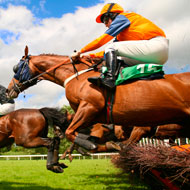Experts discuss science of prediction to prevent racehorse injuries

Fracture of the lateral condyle of the third metacarpus is the most common reason for euthanasia on the racecourse.
If racehorse injuries can be predicted, it is more likely they can be prevented, according to a new podcast.
Published in the Equine Veterinary Journal (EVJ) collection, the podcast discusses the science of prediction to prevent racehorse injuries.
Presented by Dr Tim Parkin of Glasgow University Veterinary School, the podcast explores the advantages of early MRI detection of bone changes, which occur prior to catastrophic limb fracture.
Dr Sarah Plevin of Florida Equine Veterinary Associates also takes part in the discussion, talking about the possible relationship between sesamoiditis, subclinical suspensory ligament branch change and suspensory ligament branch injury in yearling thoroughbreds.
Fracture of the lateral condyle of the third metacarpus is the most common reason for euthanasia on the racecourse, while suspensory branch ligament injury is a frequent stumbling block in yearling thoroughbreds in the initial months of training.
In the podcast, Dr Parkin and Dr Plevin both explain the potential advantages of early intervention to prevent injury and maintain racing performance.
“Major advances in diagnostic imaging mean that we are increasingly able to deploy predictive science in order to prevent serious injury,” said Professor Celia Marr, editor of the EVJ
“Important studies such as these and others supported by the HBLB are giving us real potential to rule out horses at risk and thus reduce significantly some of the welfare concerns in the horseracing world.”



 The latest
The latest